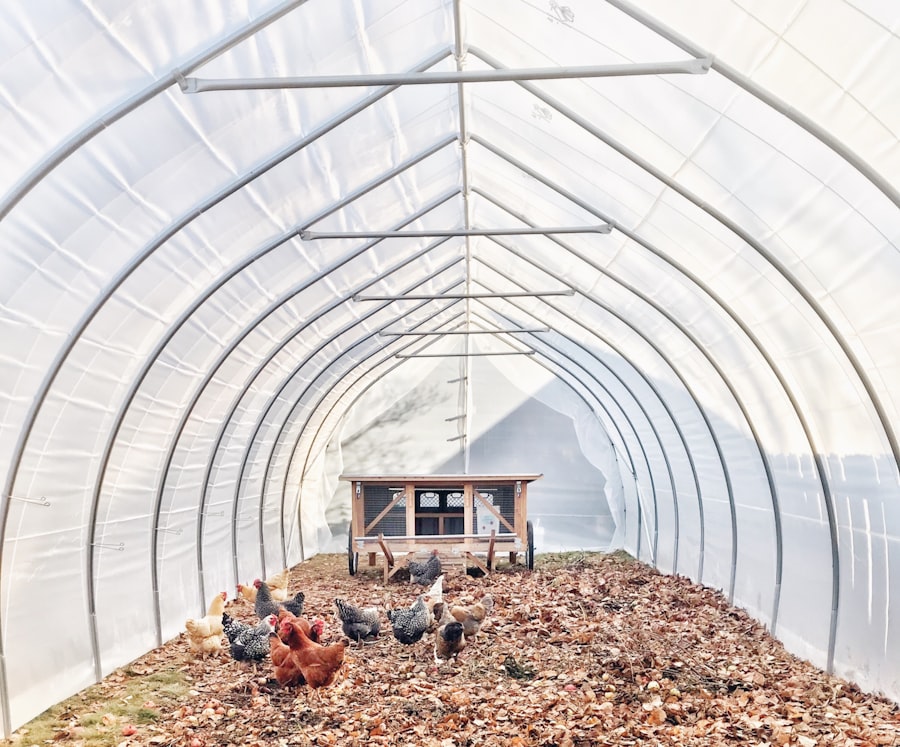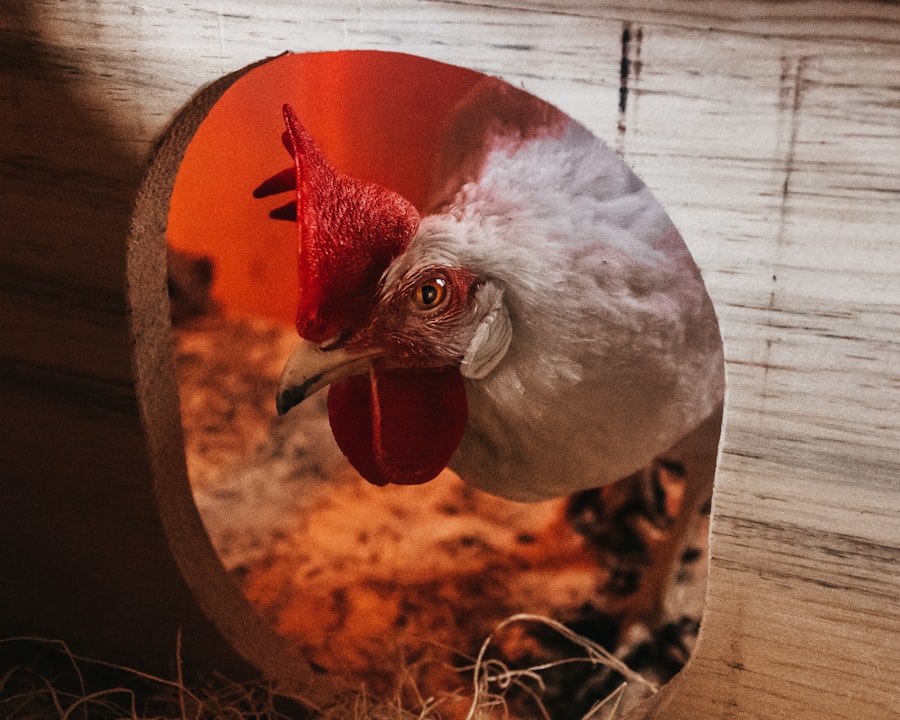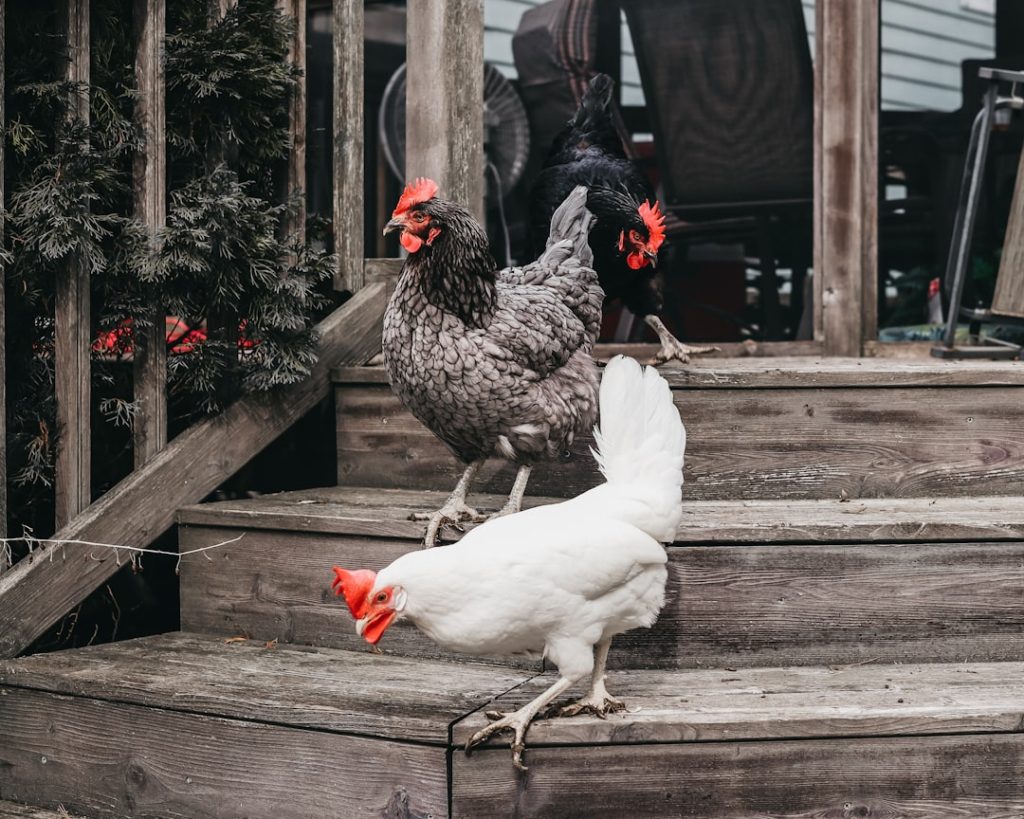Chickens are social creatures that flourish in flocks, exhibiting a natural hierarchy known as the pecking order. This social structure consists of dominant and submissive individuals, and understanding it is essential for maintaining a harmonious coop environment. Dominant chickens may exhibit aggressive behavior towards weaker flock members, necessitating adequate space and resources to reduce competition.
These birds possess a natural curiosity and enjoy exploring their surroundings. They have a strong instinct to forage, making it crucial to provide opportunities for scratching and pecking at the ground to ensure their well-being. By accommodating these natural behaviors, chicken keepers can create a coop environment that meets the birds’ needs and minimizes stress.
Chickens communicate through various vocalizations and body language. Soft clucking often indicates contentment or excitement, while loud, rapid clucking may signal distress or alarm. Recognizing these communication cues can help identify potential issues in the coop, such as overcrowding or predator threats.
Chickens are also sensitive to environmental and routine changes, so it is advisable to introduce modifications gradually to minimize stress. Understanding chicken behavior is crucial for creating an optimal coop environment that promotes their well-being and allows them to thrive. By considering their social structure, natural instincts, and communication methods, chicken keepers can ensure a healthy and productive flock.
Table of Contents
Key Takeaways
- Chickens are social animals and have a natural pecking order within their flock.
- A secure coop with proper ventilation, predator-proofing, and comfortable nesting areas is essential for the well-being of chickens.
- Fencing should be sturdy and tall enough to keep predators out and chickens in, while also providing a designated free-range area.
- Enrichment activities such as perches, dust baths, and hanging treats can keep chickens mentally and physically stimulated.
- Regular supervision and monitoring of the flock can help identify any health or behavioral issues early on, while positive reinforcement can be used for training purposes. Seeking professional help is important if any serious issues arise.
Creating a Safe and Secure Coop
Coop Construction and Security
The coop should be constructed with sturdy materials and secure fencing to prevent access from predators such as foxes, raccoons, and birds of prey. Additionally, the coop should have a solid roof to protect the chickens from aerial predators and provide shelter from the elements.
Maintenance and Inspections
It’s also important to regularly inspect the coop for any signs of wear or damage and make repairs as needed to maintain its security.
Coop Comfort and Hygiene
Inside the coop, provide comfortable nesting boxes for the hens to lay their eggs and roosting bars for them to perch on at night. The coop should also have good ventilation to prevent the buildup of moisture and ammonia from chicken droppings, which can lead to respiratory issues. Additionally, provide ample bedding such as straw or wood shavings to keep the coop clean and comfortable for the chickens.
By creating a safe and secure coop, you can protect your chickens from harm and provide them with a comfortable living space where they can thrive.
Establishing Boundaries with Fencing

Establishing boundaries with fencing is essential for keeping your chickens safe and preventing them from wandering into areas where they could be at risk. Use sturdy fencing to enclose the coop and outdoor run, making sure it extends underground to prevent digging predators from gaining access. Additionally, consider using electric fencing to deter predators and keep your chickens safe.
It’s also important to regularly inspect the fencing for any signs of damage or wear and make repairs as needed to maintain its effectiveness. When allowing your chickens to free-range, consider using temporary fencing to create designated areas where they can roam safely. This can help prevent them from wandering into areas where they could be at risk from predators or traffic.
Additionally, using temporary fencing can help protect your garden or other areas of your property from being damaged by the chickens’ foraging behavior. By establishing boundaries with fencing, you can keep your chickens safe and prevent them from wandering into areas where they could be at risk.
Providing Enrichment and Entertainment
Providing enrichment and entertainment is essential for keeping your chickens happy and healthy. Chickens are naturally curious and enjoy exploring their surroundings, so providing opportunities for them to scratch and peck at the ground can help keep them mentally stimulated. Consider scattering treats such as mealworms or scratch grains in the outdoor run to encourage natural foraging behavior.
Additionally, provide toys such as hanging mirrors or treat balls to keep the chickens entertained and engaged. Creating a dust bathing area with sand or diatomaceous earth can also provide enrichment for the chickens, as they enjoy dust bathing to keep their feathers clean and free of parasites. Additionally, providing perches or platforms for the chickens to roost on can give them opportunities for exercise and mental stimulation.
By providing enrichment and entertainment, you can keep your chickens happy and healthy while preventing boredom-related behavior issues.
Implementing Regular Supervision and Monitoring
Implementing regular supervision and monitoring is essential for ensuring the well-being of your chickens. Regularly check on the chickens to ensure they have access to food and water, are behaving normally, and are not showing any signs of illness or distress. Additionally, monitor the coop environment for any signs of damage or wear that could compromise its security.
Regularly inspect the fencing for any signs of damage or wear and make repairs as needed to maintain its effectiveness. It’s also important to monitor the chickens’ behavior when introducing new flock members or making changes to their environment. Watch for any signs of aggression or stress that could indicate issues within the flock dynamics.
Additionally, monitor the chickens’ egg production and overall health to identify any potential issues early on. By implementing regular supervision and monitoring, you can ensure the well-being of your chickens and address any issues promptly.
Using Positive Reinforcement for Training

Effective Training Methods
Using positive reinforcement for training is an effective way to encourage desired behaviors in your chickens. Chickens can be trained to come when called, use specific areas for dust bathing or foraging, or even perform simple tricks such as jumping onto a perch on command. Use treats such as mealworms or scratch grains as rewards for desired behaviors, and praise the chickens when they respond correctly.
Benefits for Chicken Well-being
By using positive reinforcement, you can encourage the chickens to engage in behaviors that are beneficial for their well-being. This approach promotes healthy habits and a happy flock.
Key Considerations
It’s important to be patient and consistent when using positive reinforcement for training, as it may take time for the chickens to learn new behaviors. Avoid using punishment-based training methods, as these can cause stress and fear in the chickens and may lead to negative behavioral issues.
Building a Positive Relationship
By using positive reinforcement for training, you can encourage desired behaviors in your chickens while building a trusting and positive relationship with them. This approach fosters a strong bond between you and your flock, leading to a more enjoyable and rewarding chicken-keeping experience.
Seeking Professional Help if Necessary
Seeking professional help if necessary is important for addressing any behavioral issues or health concerns in your flock. If you notice any signs of illness or distress in your chickens, consult a veterinarian who specializes in poultry care for a proper diagnosis and treatment plan. Additionally, if you are experiencing behavioral issues within your flock that you are unable to address on your own, consider consulting with a professional animal behaviorist who has experience working with chickens.
Professional help can also be beneficial when introducing new flock members or making significant changes to the coop environment. A professional can provide guidance on how to minimize stress and ensure a smooth transition for all the chickens involved. By seeking professional help when necessary, you can ensure the well-being of your flock and address any issues effectively.
In conclusion, understanding the behavior of chickens is crucial for creating a harmonious coop environment that meets their needs and minimizes stress. Creating a safe and secure coop with comfortable nesting boxes, roosting bars, and good ventilation is essential for protecting your chickens from predators and providing them with a comfortable living space. Establishing boundaries with fencing can help keep your chickens safe and prevent them from wandering into areas where they could be at risk.
Providing enrichment and entertainment is essential for keeping your chickens happy and healthy while preventing boredom-related behavior issues. Implementing regular supervision and monitoring is crucial for ensuring the well-being of your chickens and addressing any issues promptly. Using positive reinforcement for training can encourage desired behaviors in your chickens while building a trusting and positive relationship with them.
Seeking professional help if necessary is important for addressing any behavioral issues or health concerns in your flock effectively. By following these guidelines, you can create a safe, secure, and enriching environment for your chickens to thrive.
If you’re looking for tips on how to keep your chickens in your yard, you might also be interested in learning about different types of chicken coops. Check out this article on garden chicken coops and A-frame chicken coops for some ideas on how to provide a safe and comfortable home for your feathered friends. And if you’re considering adding geese to your flock, you might want to read up on whether geese can eat chicken feed.
FAQs
What are some effective ways to keep chickens in my yard?
Some effective ways to keep chickens in your yard include building a secure coop and run, using fencing to create a boundary, and providing regular supervision and care for your chickens.
How can I build a secure coop and run for my chickens?
To build a secure coop and run for your chickens, you can use sturdy materials such as wood and wire mesh, ensure that the coop has a secure door and latches, and provide adequate space for your chickens to move around and roost.
What type of fencing is best for keeping chickens in my yard?
The best type of fencing for keeping chickens in your yard is typically wire mesh fencing with small openings to prevent chickens from squeezing through. You can also consider adding an apron of wire mesh around the perimeter of the fence to deter predators from digging under.
How can I supervise and care for my chickens to keep them in my yard?
To supervise and care for your chickens, you can regularly check the coop and run for any signs of damage or weakness, provide a balanced diet and fresh water, and spend time with your chickens to establish a bond and encourage them to stay in the yard.
Meet Walter, the feathered-friend fanatic of Florida! Nestled in the sunshine state, Walter struts through life with his feathered companions, clucking his way to happiness. With a coop that’s fancier than a five-star hotel, he’s the Don Juan of the chicken world. When he’s not teaching his hens to do the cha-cha, you’ll find him in a heated debate with his prized rooster, Sir Clucks-a-Lot. Walter’s poultry passion is no yolk; he’s the sunny-side-up guy you never knew you needed in your flock of friends!







